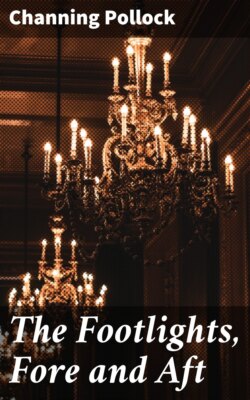Читать книгу The Footlights, Fore and Aft - Channing Pollock - Страница 3
На сайте Литреса книга снята с продажи.
AN INTRODUCTION
ОглавлениеTable of Contents
Wherein, at union rates, the author performs the common but popular musical feat known as "blowing one's own horn."
"Good wine", according to the poet, "needs no bush." With the same logic, one may argue that a good book needs no introduction.... But then—how be sure that it is a good book?
Hallowed custom provides that every volume of essays—especially of essays on the theater—shall begin with a preface in which some celebrated critic dilates upon the cleverness of the author. However, celebrated critics are expensive, and, moreover, no one else seems to know as much about the cleverness of this author as does the author himself. In consequence of which two facts, I mean to write my own introduction.
One obstacle appears to be well-nigh insurmountable. It will be easy to inform you as to my merits and my qualifications, but I don't quite see how a man can speak patronizingly of himself. And, of course, the patronizing tone is absolutely essential to an introduction. Nobody ever wrote an introduction without it. I shall do my best, but I hope you will be lenient with me in the event of failure.
"Of the making of books there is no end."
And, even to the most enthusiastic student of the stage, it must seem that a sufficiently large number of these books deal with the theater.
At least, they deal with the drama—which is slightly different. It is in this difference that one finds some excuse for the appearance of "The Footlights—Fore and Aft." Here are a collection of papers in which the reader finds no keen analysis of plays and players; no learned review of the past of the playhouse, no superior criticism of its present, no hyperbolean prophecy for its future. The book, in fact, is unique.
One might wish, indeed, that there were more substance to these essays, which reveal the impressions of a reporter rather than the excogitations of a thinker or a philosopher. Mr. Pollock severely lets alone the drama of Greece and Rome. His field is the drama of Forty-second Street and Broadway. He has rendered unto Brander Matthews the things that are Brander Matthews', and unto William Winter the things that are William Winter's.
"The Footlights—Fore and Aft" contains nothing that might not have been set down by anyone with a sense of humor and the author's opportunities of observation. It is true that, in his case, these opportunities have been exceptional. Born in 1880, Mr. Pollock's contact with the theater began as early as 1896, when he became dramatic critic of the The Washington Post. Subsequently, he served in the same capacity with various newspapers and magazines, was reporter for a "trade journal" of "the profession", and acted, for a considerable period, as press agent and business manager. The practical side of play-making and play-producing he has learned in eight years' experience as a dramatist, during which time he has written ten dramatic pieces, among them "The Pit", "Clothes", "The Secret Orchard", "The Little Gray Lady", "In the Bishop's Carriage", and "Such a Little Queen."
Considering the narrow confines of the world he describes, its comparatively small population and its rather meager language, Mr. Pollock should not be blamed too much for a certain sameness throughout "The Footlights—Fore and Aft." There are not more than a dozen prominent managers and a score of well known playwrights in America; whoever elects to write a hundred thousand words about the theater must choose between mentioning these names repeatedly and inventing new ones. Nor is it possible to avoid the recurrence of explanations and instances. You will find something about stage lighting in "The Theater at a Glance", because it belongs there, and something more about it in "What Happens at Rehearsals", because much that follows in this account would not be clear without it. The author did not flatter himself that you would carry his first description with you through a hundred pages, and, perhaps, he didn't want you to spoil a nice book by thumbing back.
In articles written at various times for various readers, there is no reason to suppose that he devised two phrases where one would serve or searched for two examples where one would do the work. Undoubtedly, many of these reiterations were weeded out in the course of compilation, and, as undoubtedly, many of them remain. All collections of stories by the same author—especially when they treat of one subject—are marred by similarity. The remedy for this rests with the reader, who is recommended to take such books in small doses—say, one essay every night at bedtime.
Generally speaking, the matter that follows will not be found unpalatable. At least, the author gives us no reason to suspect that he is displeased with it or with himself. "The capital I's", as someone has said of another series of articles, "flash past like telegraph poles seen from a car window." Mr. Pollock scolds considerably, too, though, for the most part, in perfect good humor. Indeed, whatever their faults, it must be said that these essays display some wit, and a rather delightful lightness of touch and brightness of manner. They penetrate the recesses of the topic, giving an agreeable impression of confidence, of familiarity, and of authority.
Books and plays are judged by their price and pretence. With the price of this book neither the author nor the prefacer has anything to do. It pretends to very little, and, judged by that standard, it may be acquitted.
Channing Pollock.
The Parsonage, Shoreham, L. I.,
August 25, 1911.
THE FOOTLIGHTS FORE AND AFT
I
